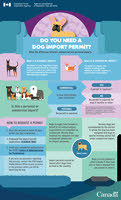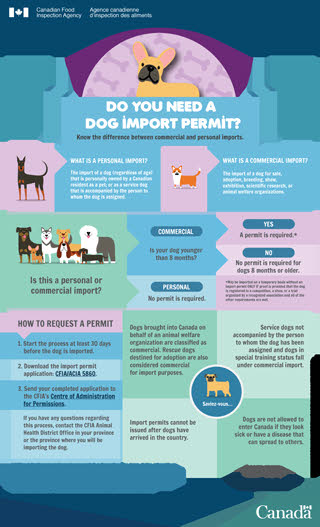
Canada import permit 320

Canadian Food Inspection Agency rules for importing dogs differ depending on the animal's age and reason for entry. Commercial puppies are subject to more restrictions than older dogs; import permits are not required for personal pets.
Click here for a larger view
Something was amiss about the dog’s story, Dr. Heather DeMille thought, as she looked into the mouth of a fluffy white dog.
Newly adopted, the Samoyed puppy had come to DeMille’s veterinary practice in Napanee, Ontario, for a checkup. Its microchip matched its paperwork and the pup seemed in good health, but the owner reported purchasing the dog through an online vendor supposedly connected to a rescue organization in Ukraine. As rescue dogs are seldom puppies, much less purebred puppies, DeMille said, she suspected that the dog had not, in fact, come from a rescue, but from a puppy mill.
Her suspicions grew when she discovered that the age on the dog's paperwork, 15 weeks, did not match what she saw. From the looks of the puppy's baby teeth, DeMille concluded that the dog was likely only 12 weeks old.
After the visit, DeMille called the federal agency that oversees the importation of dogs and other animals, the Canadian Food Inspection Agency (CFIA). She learned that the pup likely hadn't been looked at closely before it was admitted entry. The representative told her that dogs whose paperwork and microchip match aren't examined by the CFIA upon arriving in Canada.
Imports of dogs such as the one DeMille saw in her practice are attracting increased scrutiny in North America, where the growing international market for dogs is rife with fraud as importers elude importation restrictions designed to protect public and animal health, according to a report published by the U.S. Centers for Disease Control and Prevention and authored by Dr. Molly K. Houle, a veterinarian who interned with the agency's Division of Global Migration and Quarantine Zoonoses Team.
Lawmakers and regulators in the U.S. and Canada say more oversight is needed. On May 19, three veterinarian lawmakers in the U.S. Congress introduced the Healthy Dog Importation Act. The bill is designed to improve importation processes to ensure all dogs enter the U.S. free of diseases and parasites.
In Canada, one country of origin has become the face of the importation crisis: Ukraine.
The CFIA halted imports of commercial puppies from Ukraine on July 6, three weeks after finding 38 dead puppies aboard a Ukrainian International Airlines flight from Kyiv to Toronto. According to a CFIA statement, the agency no longer will issue import permits for puppies younger than 8 months, and this standard will stay in effect "until the CFIA is satisfied that import conditions and international transport standards are in place and that animals will travel safely in the future."
The flight, which arrived June 13 at Pearson International Airport in Toronto, carried 500 French bulldog puppies, many of which were dehydrated or seriously sick upon arrival. According to a government statement dated July 23, once the CFIA or the Canadian Border Services Agency confirms that import requirements have been met, they are required to release the animals to the importer. "In the case of the shipment of puppies which arrived at Pearson Airport on June 13, all live puppies were released to the importers. Given the condition of some of the puppies upon arrival, CFIA staff recommended to the individual importers coming to collect their shipments that these puppies be immediately brought to a local veterinarian for appropriate care," the news release states.
DeMille suspects that her Samoyed patient shares links with the French bulldogs. "I definitely felt that because of the paperwork, and because of what the owner told me about the transaction, that what I was seeing was a puppy-mill puppy that just happened to be from an international setting," she said. "And then when I heard about the 500-plus dogs at Pearson, that kind of solidified it in my mind that there's at least one organization that involves importers in Canada and an exporter in Ukraine that is dealing with puppy mills."
The CFIA requires that all dogs appear healthy and have necessary vaccinations and documentation to enter Canada. At the border, the Canadian Border Services Agency (CBSA) inspects all personal and commercial dogs older than 8 months and will refer them to a CFIA inspector if the animals seem ill, their paperwork is missing or anything seems suspicious.
"The CFIA will review the situation, including examination of the animal and documentation, in order to determine whether the animal is allowed to enter Canada or would be refused entry. This includes determining whether the animals presented for import are over or under 8 months of age," said Christine Carnaffan, a CFIA media relations officer.
Commercial puppies, such as those imported for resale/adoption, breeding, research or exhibition, receive a greater degree of inspection. For commercial dogs younger than 8 months, importers must obtain a permit from the CFIA, and the puppies must be inspected by a CFIA veterinarian when they arrive, Carnaffan said. The permit details vaccination history, disease status and microchipping, which is required.
Pet dogs, however, are considered to be personal imports and do not need an import permit. Importers of pet dogs must show proof of a rabies vaccination, or proof of age in the case of puppies too young to be vaccinated.
Dr. J. Scott Weese, an infectious disease veterinarian at the University of Guelph Ontario Veterinary College, has doubts about the rigor of the CFIA's oversight. In a July 7 post on his blog, Worms and Germs, Weese identified loopholes in the regulation. In a subsequent interview, he said there are a number of ways people could flout the law.
Importers or exporters could, for example, claim that commercial animals are personal pets, he said. He also cited past instances of importers transporting pregnant dogs to skirt restrictions on puppies.
And while veterinarians can check for age by examining the size, appearance and teeth of a dog, it is not always a precise call, Weese added. "If it's a 2-week-old puppy and they say it's 8 months, that's obvious," he said. "If it's a 3-month-old puppy and they say it's 8 months … is your border services agent going to flag that?"
DeMille, the practitioner who examined the Samoyed puppy, described how veterinarians determine a dog's age via dental examination: Like humans, dogs have deciduous teeth, or baby teeth, that are shed and replaced by adult teeth at a predictable age. They begin losing those first teeth at 12 weeks, and usually have a full set of adult teeth by 6 months. The Samoyed puppy still had all its deciduous teeth, indicating that the dog was younger than the 15 weeks its paperwork claimed. DeMille said subsequent checkups confirmed her original estimate of the dog's age. The dog's owner agreed to revaccinate the pup, and it is doing well, DeMille added.
Few CFIA veterinarians have a significant background in companion animals, Weese said, as their main focus is food animals, so they may not be able to catch subtle age discrepancies in puppies.
Carnaffan said she could not speak to the specific background of CFIA veterinarians but shared the qualifications required for the job. Regarding the process the agency follows, she said that commercial dogs younger than 8 months must be accompanied by an import permit, which outlines the nature of the import — commercial or personal — and identifies the importer, exporter, country of origin and route of the shipment. Additional accompanying records, such as a vaccination history, list the dog's age. If a commercial shipment of dogs younger than 8 months arrive without an import permit, it would not meet the CFIA's requirements to enter Canada and the dogs could be sent back, Carnaffan said.
When Weese spoke with the VIN News Service on July 17, he said he'd received calls in the previous week about three or four sick dogs recently arrived from Ukraine, and he had personally examined one that morning. In the past, he's also had several patients that were adopted from Ukraine die.
While adoptees from Ukraine seem to be problematic, another issue for veterinarians, he said, is that owners often do not know where their dogs came from. Knowing the country of origin gives veterinarians an indication of the pet's risk for particular infectious diseases.
"We certainly see cases where we miss things early because we didn't think about a disease," Weese said. "We're not going to think 'Leishmania' in a dog from Canada or the U.S., really. If I know that dog's from Greece then, bang, that's way up on my list." Leishmaniasis is a parasitic disease spread by the bite of certain sand flies.
Weese is developing a list of common diseases by country for use by veterinarians whose patients include imported dogs.
The ban on Ukrainian puppy imports is a step in the right direction, Weese said, but more are called for. He would like to see more rigorous health screening and preventive medicine, education of importers and border services, education of the public to reduce demand for unhealthy imported dogs, and better enforcement of existing rules.
The Ukraine ban is "a typical responsive approach," he said, "but we need to be proactive."